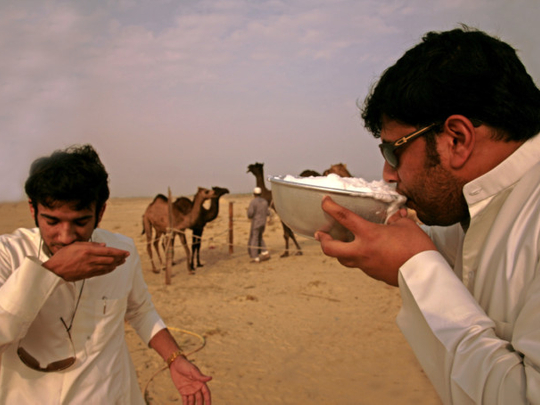
On the off chance that you dreamt you were drinking camel’s milk last night, you are about to become quite rich. Or so believe most dream interpreters in the region.
And opinions about camel milk are not limited to soothsayers. Nomads in the Middle East and Africa, who survive solely on camel’s milk for days in the harsh desert, firmly believe it has mystical powers and brings good luck and fortune. Should one question such traditional, long-standing beliefs about camel’s milk?
Special attributes
Perhaps not, especially since scientists from the industrialised world have suggested it may be a cure for diabetes and even cancer and Aids. Although much of this is speculation, it is obvious that camel’s milk possesses some superior characteristics when compared to milk from other domesticated animals. The Food and Agriculture Organisation (FAO) of the United Nations says on its website that camel’s milk is “three times as rich in vitamin C, is rich in iron, unsaturated fatty acids and B vitamins”.
Camel’s milk also most resembles human milk in composition, reduces cholesterol to improve cardiovascular health and boosts overall immunity. “Camel’s milk has as much calcium as seven sardines with their bones,” states the Emirates Industry for Camel Milk and Products (EICMP) website. High calcium content means it is ideal for pregnant women and those suffering from osteoporosis and bone damage. Dubai-based EICMP is dedicated to research and production of camel’s milk and by-products since 2003, and it was in March this year that Dubai received a much anticipated European Union approval to export camel milk dairy products to Eurozone countries.
EICMP-owned camel dairy products brand Camelicious leads the camel’s milk industry in Dubai and is preparing to export its first batch of camel’s milk powder to Europe. It is also exploring opportunities in the pharmaceutical and cosmetics industry in Europe. It plans a joint venture with universities researching the beverage’s potential in boosting immunity and treating cancer and diabetes.
Making a comeback
Camel’s milk is the same opaque white as cow’s milk and even cooks the same way. It is naturally low in fat content, much like semi-skimmed milk, but has a saltier taste.
Fresh camel’s milk has probably been consumed since the early domestication of camels along the Arabian Peninsula. Today it is consumed the world over as a curiosity, but on a daily basis by nomadic tribes in the Mena region. It is now making a comeback in the erstwhile Bedouin UAE.
Two generations ago, it was not uncommon for families to drink camel’s milk on a regular basis, and it is once again vying for a place in popular culture on supermarket shelves, café menus, fine dining restaurants and beauty treatments. Fresh camel’s milk by Camelicious and Al Ain Dairy can be found in almost all large supermarkets in Middle Eastern blends of rose, saffron and date, to name a few. Local House Restaurant, located in Dubai’s historical Shindagah district and often frequented by tourists, was perhaps the first place in the emirate to commercialise camel meat and milk, sharing a part of local culture that was inaccessible to outsiders.
Cafe2go at Al Murooj Rotana on Shaikh Zayed Road offers cold and hot coffee blends made with camel’s milk and a variety of camel’s milk shakes. Switch Restaurant and Lounge in the Dubai Mall serves a mean camelccino and camel latte, as does Jumeirah at Emirates Towers in Abu Dhabi. Al Nassma camel’s milk chocolates, which come with orange or mixed nuts, have been in the market for a few years now. Al Nassma now serves camel’s milk ice cream, muffins, pastries and cakes in the Majlis Café at the Dubai Mall.
Perhaps the most exciting development has been camel’s milk cheese. The composition of camel’s milk does not let it curdle easily, making it difficult to make cheese. After more than a year of tests, the Camelicious White Gold cheese range (starting from Dh39 for 200g) went on sale in the beginning of the year: Nabulsi, with caraway seeds, Akkawi, a soft, unripened cheese with a smooth texture and a salty taste, and traditional white cheese, which resembles cottage cheese.
The next step is a thumbs up from the US Food and Drug Administration. This could see camel milk production become an important industry in the UAE. The FAO estimates it could be worth $10 billion in the near future.










